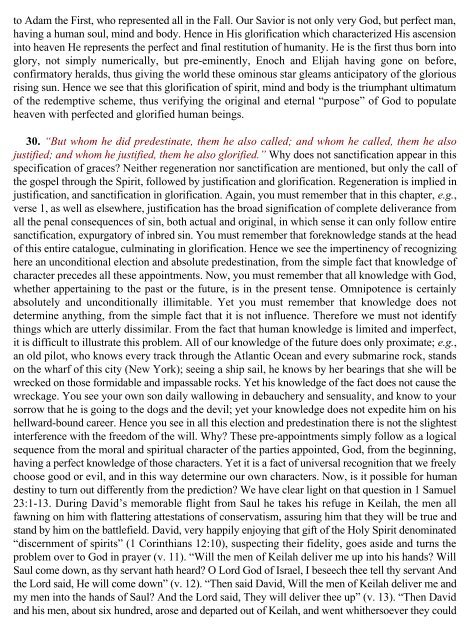Godbey's Commentary - Acts - Romans - Enter His Rest
Godbey's Commentary - Acts - Romans - Enter His Rest
Godbey's Commentary - Acts - Romans - Enter His Rest
You also want an ePaper? Increase the reach of your titles
YUMPU automatically turns print PDFs into web optimized ePapers that Google loves.
to Adam the First, who represented all in the Fall. Our Savior is not only very God, but perfect man,<br />
having a human soul, mind and body. Hence in <strong>His</strong> glorification which characterized <strong>His</strong> ascension<br />
into heaven He represents the perfect and final restitution of humanity. He is the first thus born into<br />
glory, not simply numerically, but pre-eminently, Enoch and Elijah having gone on before,<br />
confirmatory heralds, thus giving the world these ominous star gleams anticipatory of the glorious<br />
rising sun. Hence we see that this glorification of spirit, mind and body is the triumphant ultimatum<br />
of the redemptive scheme, thus verifying the original and eternal “purpose” of God to populate<br />
heaven with perfected and glorified human beings.<br />
30. “But whom he did predestinate, them he also called; and whom he called, them he also<br />
justified; and whom he justified, them he also glorified.” Why does not sanctification appear in this<br />
specification of graces? Neither regeneration nor sanctification are mentioned, but only the call of<br />
the gospel through the Spirit, followed by justification and glorification. Regeneration is implied in<br />
justification, and sanctification in glorification. Again, you must remember that in this chapter, e.g.,<br />
verse 1, as well as elsewhere, justification has the broad signification of complete deliverance from<br />
all the penal consequences of sin, both actual and original, in which sense it can only follow entire<br />
sanctification, expurgatory of inbred sin. You must remember that foreknowledge stands at the head<br />
of this entire catalogue, culminating in glorification. Hence we see the impertinency of recognizing<br />
here an unconditional election and absolute predestination, from the simple fact that knowledge of<br />
character precedes all these appointments. Now, you must remember that all knowledge with God,<br />
whether appertaining to the past or the future, is in the present tense. Omnipotence is certainly<br />
absolutely and unconditionally illimitable. Yet you must remember that knowledge does not<br />
determine anything, from the simple fact that it is not influence. Therefore we must not identify<br />
things which are utterly dissimilar. From the fact that human knowledge is limited and imperfect,<br />
it is difficult to illustrate this problem. All of our knowledge of the future does only proximate; e.g.,<br />
an old pilot, who knows every track through the Atlantic Ocean and every submarine rock, stands<br />
on the wharf of this city (New York); seeing a ship sail, he knows by her bearings that she will be<br />
wrecked on those formidable and impassable rocks. Yet his knowledge of the fact does not cause the<br />
wreckage. You see your own son daily wallowing in debauchery and sensuality, and know to your<br />
sorrow that he is going to the dogs and the devil; yet your knowledge does not expedite him on his<br />
hellward-bound career. Hence you see in all this election and predestination there is not the slightest<br />
interference with the freedom of the will. Why? These pre-appointments simply follow as a logical<br />
sequence from the moral and spiritual character of the parties appointed, God, from the beginning,<br />
having a perfect knowledge of those characters. Yet it is a fact of universal recognition that we freely<br />
choose good or evil, and in this way determine our own characters. Now, is it possible for human<br />
destiny to turn out differently from the prediction? We have clear light on that question in 1 Samuel<br />
23:1-13. During David’s memorable flight from Saul he takes his refuge in Keilah, the men all<br />
fawning on him with flattering attestations of conservatism, assuring him that they will be true and<br />
stand by him on the battlefield. David, very happily enjoying that gift of the Holy Spirit denominated<br />
“discernment of spirits” (1 Corinthians 12:10), suspecting their fidelity, goes aside and turns the<br />
problem over to God in prayer (v. 11). “Will the men of Keilah deliver me up into his hands? Will<br />
Saul come down, as thy servant hath heard? O Lord God of Israel, I beseech thee tell thy servant And<br />
the Lord said, He will come down” (v. 12). “Then said David, Will the men of Keilah deliver me and<br />
my men into the hands of Saul? And the Lord said, They will deliver thee up” (v. 13). “Then David<br />
and his men, about six hundred, arose and departed out of Keilah, and went whithersoever they could
















